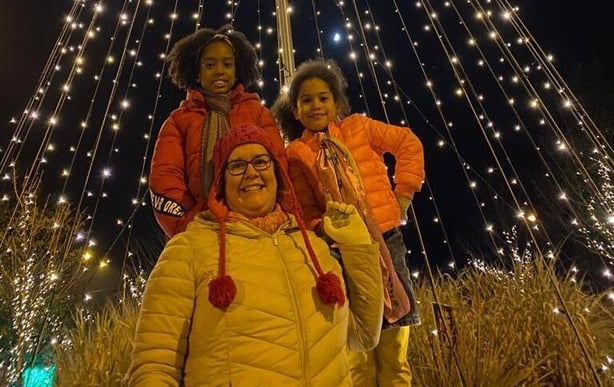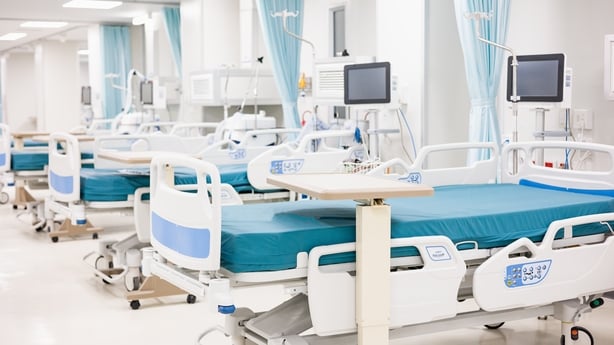More than two-and-a-half years after initially contracting Covid-19, Tanja Buwalda says that living with Long Covid is "a million times worse" than the virus itself.
"It limits your life, it's effectively a disability," she told RTÉ News.
"Covid, I breezed through. It was five days. I rested a little bit. This is two-and-a-half years later. That's an awful long time to not have your life back."
The mother of two from Crosshaven in Co Cork is a founding member of Long Covid Advocacy Ireland.
The group was involved in a new piece of research into Long Covid published today, in conjunction with APC Microbiome in UCC, and clinicians at Cork University Hospital.
Ms Buwalda said that for her, Long Covid started with "very little" and "very subtle" symptoms straight away, but they built up and eventually at her worst point, she was experiencing 20 different symptoms, including extreme tiredness, breathlessness, heart palpitations and digestive issues.
She said that she also experienced dizziness just getting up from the sitting position and, at one point, she fainted and hit her head.
By Christmas 2020, nine months after getting the infection, Ms Buwalda described being at her parents' house for Christmas dinner, realising she had what she described as a disability.
"I was in bed. I didn't have the energy to get to the dinner table without help. I ate two mouthfuls of the dinner and went back to bed," she said.
"That's not normal to be like that. I'm a young-ish mum of two kids, I need to be active, enjoying life and I had no quality of life at that point."
She said that her daily life is still impacted by Long Covid all this time later.

"Its life-limiting in the things that I can do and the things that I choose to do," she said.
"I can't go very far distances, I need to know where a bathroom is all the time, I certainly can't do any social activities or enjoy life, because the little energy that I have has to go into getting the kids sorted for school, getting to work and getting home again, and that's it," she said.
"That's the extent of my energy."
Ms Buwalda also said she has had to rely "more than she should" on her 11- and 8-year-old children for some physical household tasks that she cannot do.
She said there should be multi-disciplinary teams to deal with Long Covid patients.
Professor Corinna Sadlier, a Consultant in Infectious diseases at Cork University Hospital, said that Long Covid in Ireland should be a public health concern.
She said the survey published today showed that the symptoms of the condition are having very significant impacts on patients, on physical and mental health, and on their quality of life.
Prof Sadlier said that there is currently no one test or treatment for Long Covid, and patients are treated for individual symptoms they have.
She said we still do not know why some people suffer from the condition and others do not, and that that further research into Long Covid is required.
"We know there are certain risk factors for Long Covid," she said.
"Females tend to be more affected than males, people with co-morbidities tend to be more commonly affected, but we don't know why.
"There really needs to be a research focus in terms of what the underlying mechanisms of Long Covid are. They'll be really important in guiding targeted treatments for these patients," she added.
HSE recruiting extra staff for Covid clinics

A total of 22 extra staff have so far been recruited to work in Long Covid and Post-Acute Covid clinics in hospitals around the country.
The HSE says that recruitment to support existing staff for these clinics remains ongoing.
The exact number of patients with Long Covid in Ireland remains unknown, but an estimated 10-20% of Covid-19 patients experience lingering symptoms for weeks to months following their initial infection.
The HSE's interim model of care for Long Covid recommended the establishment of six Long Covid clinics and eight post-acute covid clinics, as well as one tertiary referral neurocognitive clinic for those with complex neuro-cognitive/neuropsychological symptoms.
The HSE has confirmed that to date, four out of six Long Covid clinics are now operational.
These include St Vincents University Hospital, Beaumont Hospital and University Hospital Galway.
Infectious diseases consultants will lead these Long Covid clinics.
The HSE also said that five out of eight post-acute covid clinics - to ensure that patients who were in hospital for Covid-19 treatment and have recovered - have also been established, including at University Hospital Galway, the Mater University Hospital and Connolly Hospital Blanchardstown.
These clinics are being led by respiratory consultants.
It said that both Tallaght University Hospital and St James' hospital are operating combined post-acute and Long Covid clinics, while it is anticipated that a dedicated Long Covid clinic will open at Cork University hospital will open later this month.
Work is ongoing with Letterkenny University Hospital and Limerick University Hospital to establish "a more definitive timeline around their anticipated launch dates".
The HSE said that where staff have yet to be recruited to Long/Post-Acute Covid Clinics, patients are being seen by existing staffing and resources within the hospitals.
As well as the clinics in acute hospitals, the HSE's model of care for Long Covid also sets out a framework for services and supports across general practice and community services.
The impact of Long Covid in Ireland will also be the subject of a debate in the Dáil on Wednesday.
The Regional Group of TDs will be tabling a motion, calling for the rollout of these services to support people suffering with Long Covid, including full staffing of these Long and post covid clinics.






